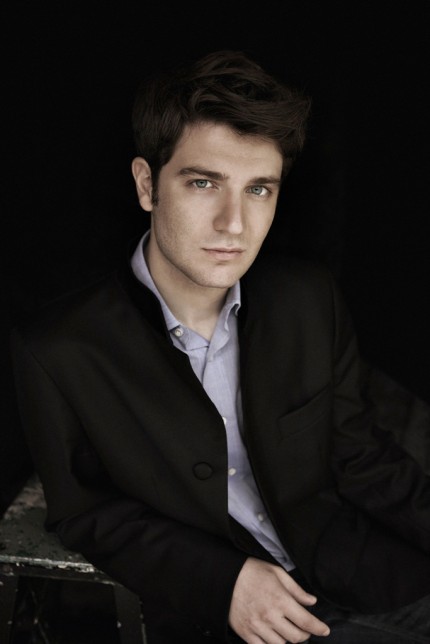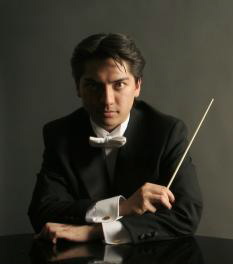Alessio Bax provides the highlights in mixed Grant Park program

The Fourth of July was a day earlier but the Grant Park Music Festival continued the celebration Friday night with conductor Eugene Tzigane leading two works by American composers twined with likely the most celebrated symphony written, in part, on American soil.
Samuel Barber’s Violin Concerto has clawed its way into the standard repertory over the past two decades, beloved by audiences and soloists for its blend of heart-easing melody and fiddle fireworks.
Barber’s Piano Concerto (1962) has not fared so well, and it’s not difficult to understand why. The thematic material is less memorable and the first movement tends to sprawl, with a rather note-spinning solo part that at times seems only incidentally conjoined with the orchestra.
Making his festival debut, Alessio Bax provided about as compelling advocacy as one is likely to hear of this uneven work. The Italian pianist, a top winner at the Leeds Piano Competition, clearly has an imposing technical arsenal, with his even, light-fingered articulation blazing through the virtuosic demands with little apparent difficulty.
Bax’s bracing prestidigitation was evident in the strongly projected playing of the declarative solo that begins the work, and even more in the explosive later cadenza and his consistently fast and accurate passagework. Yet the soloist was also able to relax into the more lyrical sections, with some affecting phrasing in the Canto middle movement.
The final movement echoes the moto perpetuo style of Barber’s Violin Concerto, with the soloist’s music here infused with a driving bass ostinato amid ample bursts of bravura. Bax racheted up the power and velocity in the virtuosic final section, making the sparks fly in a combustible coda.
Tzigane’s accompaniment was simpatico with his soloist, if rather workmanlike and fitfully prosaic with burly textures and winds not always blended.

In his lakefront debut, the Japanese-American conductor, 30, made an equally mixed impression in the evening’s closer, Dvorak’s not unfamiliar Symphony No. 9, “From the New World.” Much of the performance was sturdy and middle of the road yet there were odd lapses, with Tzigane making little of his opportunities to say something distinctive or individual in this oft-played score.
The opening cello statement was skated over with little expression and the Largo was blandly played for all of Tzigane’s fussy gestures, unaided by a straitened dynamic range and some edgy wind tuning. The loud and fruity English horn solo had little raptness or delicacy; even if due to overmiking, Tzigane should have made a quick adjustment for the player to take the volume down.
The latter two movements went better with the finale drawing playing of greater fire and conviction from the orchestra, but this was hardly an auspicious podium debut for the young conductor.
The evening led off with William Bolcom’s Ragomania. The overture was written for the Boston Pops in 1982 and, frankly, sounded like it. Bolcom here makes little use of his ragtime elements and the work sounds like one of Leroy Anderson’s less-inspired creations, noisy, unsubtle and overlong at ten minutes. With all the unplayed American repertory, couldn’t one have come up with something more substantial than this?
The program will be repeated 7:30 p.m. Saturday. Admission is free. grantparkmusicfestival.com
Posted in Uncategorized


